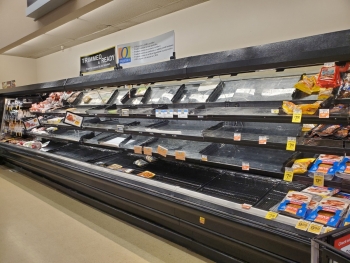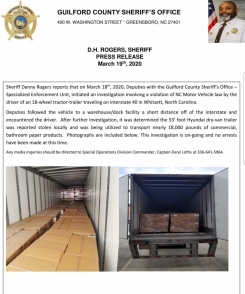
By Rebecca Jefferis Williamson
Miriam Raftery also contributed to this report
Photo, left by Rebecca Jefferis Williamson: Meat aisle at Vons in Santee was picked nearly clean by shoppers yesterday.
March 15, 2020 (East County)—After public health officials recommended stocking up on 14 days of supplies in the event of home quarantine during the local, state and federal COVID-19 emergency declarations, shoppers overwhelmed many local stores, causing long lines and local shortages.
Officials are now urging the pubic not to hoard products, to assure that everyone will have access to items that they need. Some stores are also beginning to limit sales to prevent hoarding or reselling items at a higher price. (It is illegal to price gouge during a declared emergency and violators can be fined or imprisoned).
Shoppers yesterday were out in force piling their shopping carts not only with toilet paper but with meats, canned beans, breads, potatoes (if they can find them), and other products. At Trader Joe’s in La Mesa, the line when the store opened extended from one end of the shopping center to the other. Inside, the checkout line stretched to the back of the store.
 Photo, right: Checkout line at Trader Joe's in La Mesa Saturday.
Photo, right: Checkout line at Trader Joe's in La Mesa Saturday.
Social media platforms were filled with pictures of empty or partially filled shelves from all around the county and across the nation as some suppliers run out. While panic buying has occurred in the past during disasters such as hurricanes, the impacts have been regional, not national.
Some shoppers were “store hopping” to get products they need. Vons, Smart & Final, and Costco, to name a few, were either cleaned out of select products or limiting the number of any in demand items. Parents and groups were having family members or friends act as scouts via cellphones to find products they needed and report where they could be found.
It is not all panic buying. With colleges and universities closing down, college students are coming back home, and more groceries will be needed in the home. School kids in grades K-12 off due to school closures also mean more food is needed in homes for lunches, not just breakfast and dinner.
Store hours at some businesses are being altered to restock or clean. Check websites for adjusted store hours before you shop to avoid being frustrated.
Individuals who are self-isolating, self-quarantined, or not working due to their business closing down are also stocking up.
Amid the chaos were acts of kindness, with some shoppers sharing items they acquired with others after stock ran out. One customer reportedly paid for part of a family’s cartful of food when they came up short on cash.
Stores seek to restore order
Some stores, such as Target, have set limits on sales of certain items, such as restricting how many packages of toilet paper any one person could buy.
Stores were also having staff in some stores guiding the shoppers to open cash registers or limiting how many could go in a store at any given time.
Some stores posted signs next to cash registers announcing that no cash back was allowed or that cash back was limited to $60. Some individuals were pulling out the maximum of $200 cash from in-store ATMs.
Options to avoid crowded stores and long lines
Home delivery services such as DoorDash, InstaCart or even Amazon Prime can be utilized for some products or meals from restaurants.
Consider signing seniors up for Meals on Wheels, which offers low cost and nutritious meal delivery services to their homes.
To find scarce items that you need, ask when stores expect new deliveries and when they plan to restock. Some are restocking at varying times or days according to employees busy restocking shelves. Others must wait on the next delivery truck.
Not all stores are out of “hot” products. Shoppers have tended to flock to the big discount stores first for better prices.
Smaller neighborhood markets and ethnic grocery stores may be easier options to find foods and other items. Convenience stores such as 7-11, pharamacies or other outlets may be worth paying a slightly higher price if you just need a few items such as bread, milk, or toiletries.
Editor's note: Please call to check in on neighbors, friends and relativies who are elderly, disabled, or don't drive to ask if they need help to obtain food, toiletries and medications. Everyone is encouraged to have a 14-days supply of foods, prescription and over-the-counter medications, toiletries, soap, laundry soap, and pet supplies --- but not more than that. Our tap water locally is fine to drink, so there is no need to purchase bottled water for this situation. Don't hoard items such as toilet paper and hand sanitizers that are in short supply. Remember, it's important to be sure everyone has access to items such as soap and hand sanitizers, to help keep everyone healthy.







Comments
Glad they caught the TP thieves!
I hope they get those rolls back to stores soon.
Stolen truck in North Carolina w/ 18,000 pounds of Toilet Paper
Possibly contributing to the panic buying referenced in subject story is this stolen truck in North Carolina with 18,000 pounds of badly needed toilet paper pictured here.